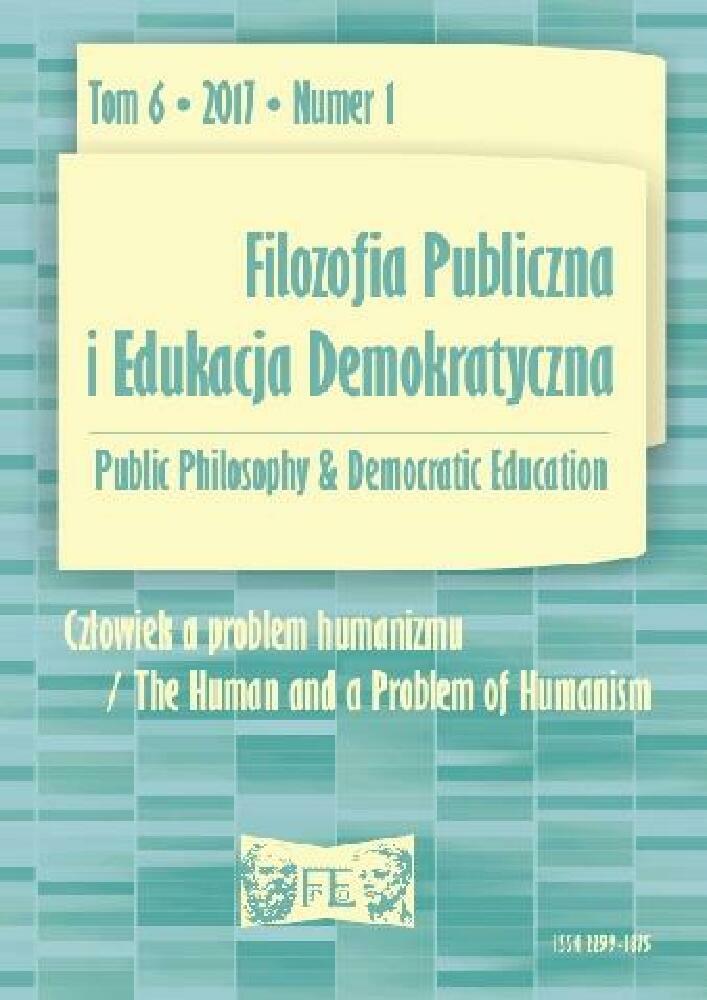Abstrakt
Question about human is the basic thread of contemporary philosophy of dialogue. It does not cause neither systematic concept of human, nor any system of anthropology (in meaning proposed by twentieth-century initiators), but impacts on marginalization of anthropological imponderabilia. Negatively – it was caused by refusal anthropological projects belonging to philosophical heritage by Philosophers of Dialogue. Positively – it was related to new anthropological perspective formulated by these philosophers. By asking questions about human they amend the old yet still important oppositions: nature versus culture and nature versus history (being variant of this first one). The most essential matter in their perspective is opposition between what belongs to nature (different from biological assumptions) and what is relevant to normative perspective. This suspense between two planes – descriptive and prescriptive – seems to be a consequence of the philosophical assumptions of Philosophers of Dialogue and argument for polifonia of anthropological discourse.Bibliografia
Buber M., Das Wort, das gesprochen wird , Werke, Bd. I: Schriften zur Philosophie, Kösel & Lambert Schneider Verlag, München – Heidelberg 1962.
Buber M., Hebräischer Humanismus, [w:] tenże, Der Jude und sein Judentum, Joseph Melzer Verlag, Köln 1963.
Buber M., Werke, Bd. II: Schriften zur Bibel, Kösel & Lambert Schneider Verlag, München – Heidelberg 1964.
Buber M., Das dialogische Prinzp, Verlag Lambert Schneider, Heidelberg 1973.
Buber M., Ja i Ty. Wybór pism filozoficznych, przeł. J. Doktór, Warszawa 1992.
Bukowski J., Czy ks. Tischner przełamuje „cogito”?, „Analecta Cracoviensia”, 1981, t. XIII.
Feuerbach L., Zasady filozofii przyszłości, [w:] tenże, Wybór pism, przeł. K. Krzemieniowa i M. Skwieciński, PWN, Warszawa 1988, T. II: Zasady filozofii przyszłości i inne pisma.
Heidegger M., Bycie i czas, przeł. B. Baran, Warszawa 1994.
Heschel A. J., Between God and Man. An Interpretation of Judaism, Ed. F.A. Rotschild, New York 1975.
Heschel A. J., Kim jest człowiek?, przeł. K. Wojtkowska, Łódź – Warszawa 2014.
Landmann M., Fundamental – Anthropologie, Bouvier Verlag Herbert Grundmann, Bonn 1979.
Lévinas E., Całość i nieskończoność. Esej o zewnętrzności, przeł. M. Kowalska, PWN, Warszawa 1998.
Lévinas E., Inaczej niż być lub poza istotą, przeł. P. Mrówczyński, Aletheia, Warszawa 2000.
Rosenzweig F., Gwiazda Zbawienia, przeł. T. Gadacz, Znak, Kraków 1998.
Scheler M., Człowiek i historia, przeł. A. Węgrzecki, [w:] tenże, Pisma z antropologii filozoficznej i teorii wiedzy, przeł. S. Czerniak i A. Węgrzecki, PWN, Warszawa 1987.
Schaeder G., Martin Buber. Hebräischer Humanismus, Göttingen 1966.
Scheler M., O idei człowieka, przeł. A. Węgrzecki, [w:] tenże, Pisma z antropologii filozoficznej i teorii wiedzy, PWN, Warszawa 1987.
Stróżewski W., Racjonalizm i metaracjonalizm, „Studia Filozoficzne”, nr 5/6, 1983.
Szczerbiński W., Abrahama Josshuy Heschela filozofia człowieka, KUL, Lublin 2000.
Theunissen M., Transcendentalny projekt ontologii społecznej a filozofia dialogu, przeł. J. Doktór, [w:] Filozofia dialogu, oprac. B. Baran, Kraków 1991.
Theunissen M., Der Andere. Studien zur Sozialontologie der Gegewart, Walter de Gruyter Verlag, Berlin –New York 1997.
Tischner J., Przestrzeń obcowania z Drugim, „Analecta Cracoviensia” 1977, t. IX.
Tischner J., Filozofia dramatu, Znak, Kraków 2012.
Węgrzecki A., Rola idei człowieka w badaniu antropologii filozoficznej, [w:] Studia z filozofii niemieckiej, t. 4: Antropologia filozoficzna, red. S. Czerniak, J. Rolewski, Wyd. UMK, Toruń 2004.
Licencja
Prawa autorskie (c) Autorzy zachowują prawa autorskie i prawa do publikacji swoich artykułów w tym czasopiśmie, przyznając czasopismu prawo do ich rozpowszechniania na warunkach CC BY-NC-ND 4.0
